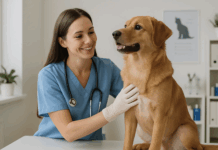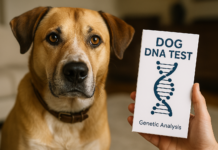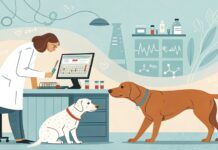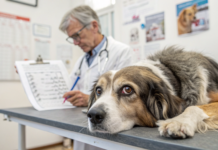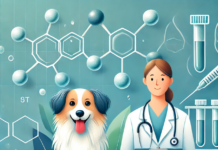Last Updated on April 30, 2021 by Dogs Vets
Can Dogs Eat Apples
You know, as the saying goes, “An apple a day keeps the doctor away.” But can dogs eat apples? Yes, they can! And most dogs love them, too.
Are apples good for dogs?
Apples are a well-known excellent source of vitamin C, fiber, calcium, and phosphorus and a safe way to satisfy your pet’s sweet tooth (unlike chocolate and other dog food numbers). The apple fruit is also relatively low in calories, and many dogs love the taste of apples as well as the crunch sensation.
Chewing an apple can also help to clean your dog’s teeth but should not replace actual dental care.
Here’s how to safely feed your dog apples
When you feed your dog an apple, it’s best to cut it into slices or chunks to make it a lot easier for your dog to chew. Please do not give your dog seeds, as they contain cyanide, a toxic substance.
You would also want to keep the apple core, including the stem, away from your pup, as this is a choking hazard. If you ever feed your dog too many apples at any point, your dog may get stomach aches and diarrhea. Therefore, it is best to feed your dog apples with caution.
See also: What dogs are hypoallergenic? – Top 10 Best Hypoallergenic Dog Breeds
You can also use apples in recipes when cooking or making special food for your dog. One of our favorite recipes is apple pretzels for dogs, an easy-to-prepare recipe that contains only three tasty ingredients: Almond flour, eggs, and unsweetened applesauce.
Can dogs eat apples? – Fruits dogs can and can not eat.
1. Apples
Yes, dogs can eat apples. Apples are an excellent source of vitamins A and C as well as fiber for your dog. They are low in protein and fat, making them the perfect snack for older dogs. Remove the seeds and core first. Try them frozen for an icy snack in warm weather.
2. Avocado Fruits
No, dogs should not eat avocado. While avocado can be a healthy snack for dog owners, it should not be given to dogs at all. The pit, skin, and leaves of avocados contain persin, which often causes vomiting and diarrhea in dogs. The fleshy inside the fruit does not have as much persin as the rest of the plant, but it is still too much for dogs.
3. Bananas
Yes, dogs can eat bananas. In moderation, bananas are a great low-calorie treat for dogs. They are rich in potassium, vitamins, biotin, fiber, and copper. They are low in cholesterol and sodium, but due to their high sugar content, bananas should be given as a treat, not part of your dog’s main diet.
4. Blueberries
Yes, dogs can eat blueberries. Blueberries are a superfood rich in antioxidants that prevent cell damage in humans and dogs alike. They are also filled with fiber and phytochemicals. Are you teaching your dog to catch treats in mid-air? Try blueberries as an alternative to store-bought treats.
5. Cherries
No, dogs are not recommended to eat cherries. Except for the fleshy part around the seed, cherry plants contain cyanide and are toxic to dogs. Cyanide interferes with cellular oxygen transport, which means your dog’s blood cells can’t get enough oxygen. If your dog eats cherries, be on the lookout for dilated pupils, difficulty breathing, and red gums, as these can be signs of cyanide poisoning.
6. Cranberries
Yes, cranberries are safe for dogs. Both cranberries and dried cranberries can be safely fed to dogs in small amounts. Whether your dog likes this tart is another question. In any case, moderation is important when feeding dogs cranberries, as with any treat, as too many cranberries can cause stomach upset.
7. Cucumbers
Yes, dogs can eat cucumbers. Cucumbers are especially good for overweight dogs because they contain little to no carbohydrates, fats, or oils and can even boost energy levels. They are loaded with vitamins K, C, and B1 and potassium, copper, magnesium, and biotin.
See also: See pictures of All Dog Breeds pictures and their names from A to Z
8. Grapes
No, dogs should never eat grapes. Grapes and raisins (dried grapes) are very toxic to dogs, regardless of breed, sex, or age of the dog. In fact, grapes are so toxic that they can cause acute sudden kidney failure. Always keep this dangerous fruit in mind for dogs.
9. Mango
Yes, dogs can eat mangoes. This sweet summer treat contains four different vitamins: A, B6, C, and E. They also contain potassium as well as beta-carotene and alpha-carotene. Remember, as with most fruits, remove the hard pit first, as it contains small amounts of cyanide and can lead to choking hazards. Mango is high in sugar, so use it occasionally.
1o. Oranges
Yes, dogs can eat oranges. According to veterinarians, oranges are fine for dogs, but they don’t like strong-smelling citrus fruits. Oranges are an excellent source of vitamin C, potassium, and fiber, and in small amounts, the juicy flesh of an orange can be a treat for your dog.
Veterinarians recommend tossing the peel and offering your dog only the flesh of the orange, without seeds. Orange peels stress the digestive system, and the oils can literally cause your dog to turn up his sensitive nose.
Top 10 Vegetables dogs can and can not eat
1. Asparagus
No, dogs should not eat asparagus. While asparagus is not necessarily unsafe for dogs, it doesn’t make sense to give it to them. It’s too hard to eat raw, and if you cook it to make it soft enough for dogs to eat, asparagus will lose the nutrients it contains. If you really want to share a vegetable, something more beneficial is probably best.
2. Broccoli
Yes, broccoli is safe for dogs in very small amounts and is best served occasionally. It is high in fiber and vitamin C and low in fat. However, broccoli florets contain isothiocyanates, which can cause mild to potentially severe stomach irritation in some dogs. In addition, broccoli stems have been known to cause esophageal obstruction.
3. The Brussels sprout
Yes, dogs can eat Brussels sprouts. Brussels sprouts are full of nutrients and antioxidants that are great for both humans and dogs. However, do not overfeed them to your dog as they can cause a lot of gas. Cabbage is also safe for dogs but comes with the same gas warning!
4. Carrots
Yes, dogs can eat carrots. Carrots are an excellent low-calorie snack that is high in fiber and beta-carotene and produces vitamin A. Plus, crunching on these orange vegetables is great for your dog’s teeth (and fun).
5. Celery
Yes, celery is safe for dogs. In addition to vitamins A, B, and C, this crunchy green snack contains the nutrients needed to promote a healthy heart and even fight cancer. As if that weren’t enough, celery is also known to freshen dogs’ breath.
6. Green beans
Yes, dogs can eat green beans. Chopped, steamed, raw, or canned – all types of green beans are safe for dogs to eat as long as they are plain. Green beans are full of important vitamins and minerals, high in fiber and low in calories. Opt for low-salt or salt-free products when feeding canned green beans to your dog.
7. Mushrooms
No, dogs should avoid mushrooms. Wild mushrooms can be toxic to dogs. While only 50-100 of the 50,000 species of mushrooms worldwide are known to be poisonous, poisonous ones can really hurt your dog or even cause death. Washed white mushrooms from the supermarket might be okay, but it’s better to be safe than sorry. Skip the mushrooms for Fido altogether.
8. Onions
No, dogs should never eat onions. Onions, leeks, and chives belong to a plant family called Allium, which is toxic to most pets, especially cats. Eating onions can cause your dog’s red blood cells to burst and cause vomiting, diarrhea, stomach pain, and nausea. Onion poisoning is more severe in Japanese dog breeds like Akitas and Shiba Inus, but all dogs are very susceptible to it.
9. Peas
Yes, dogs can eat peas. Green peas, snow peas, snap peas, and garden peas or English peas are occasionally okay if dogs can find them in their bowl. Peas have several vitamins, minerals and are high in protein and high in fiber. You can feed your dog fresh or frozen peas, but avoid canned peas with added sodium.
10. Spinach
Yes, dogs can eat spinach, but it is not one of the best vegetables to share with your pup. Spinach is high in oxalic acid, which blocks the body’s ability to absorb calcium and leads to kidney damage. While your dog would probably need to eat a very large amount of spinach to have this problem, it may be best to go with another vegetable.
FAQ’S
Is it safe for dogs to eat apples?
Are Apples Good for Dogs? Apples can be good for your dog as a treat. Apples are a source of dietary fiber and carbohydrates. Apples contain vitamin C, but dogs don’t need it.
How many apples can I give my dog?
In moderation. If there are pieces of skin on the apple slices, that’s okay. It is good to peel the apple completely first and then divide the apple slices with your best friend. If you are working on dropping the apple pie and peel slices on the floor, your dog will be fine if he eats a little.
Why are apples bad for dogs?
The main things to watch out for when feeding apples to your dog are the seeds and the core. The seeds contain trace amounts of cyanide which is toxic. … Additionally, too many apples can cause stomach upset and diarrhea in even healthy dogs.
Are Cooked Apples Suitable for Dogs?
Both applesauce and cooked apples are safe for your dog and puppy. My recommendation is to try to avoid spices, salt, and sugar whenever possible. You will want to make your apples and sauce as plain as possible to keep your dog happy and healthy.
See also: Top best names for german shepherd dog in 2021 (Male + Female)
Fact Check
We strive to provide the latest valuable information for pet lovers with accuracy and fairness. If you would like to add to this post or advertise with us, don’t hesitate to reach us. If you see something that doesn’t look right, contact us!
Reference: www.akc.org



